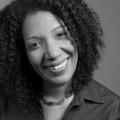A MILLION YEARS ago, when I was 23 years old, I sat in a lecture hall, flanked by college students who tutored at the youth program where I worked. They had invited me to their campus ministry’s worship service. An Asian-American woman named Susan Cho—young (about my age), tall, straight-backed, clear-voiced, and refreshingly funny—stepped to the podium and began preaching.
I sat transfixed. She dove into the scripture and it came alive! She explained what was going on in the world of the biblical characters in a way that made it feel as if they were living today. I felt like I knew them—I understood them. And then she brought home the meaning of the text for our lives in Los Angeles, months after the 1992 riots. This woman gave one of the most dynamic and biblically accurate sermons I had ever heard.
But then a familiar thought came into my head: “This is heresy,” it whispered.
You see, in college I was part of an evangelical ministry in which women could lead behind the scenes and share their testimony during worship services, but we could not preach or, for that matter, teach the scripture—especially to men. Ideas of male dominance were never taught outright, but they were observed like tenets of the faith.
Still, my passion for my faith compelled me to lead. I didn’t teach, but instead I started leading the musical worship times for our large-group meetings. Leading these fellow students, I felt myself come alive. I marveled every week as I helped my friends make a closer connection to God through song.
Then one day my senior year, a man who had experience leading worship joined our ministry’s staff team. Taking me aside, he said, “Now that I’m here, it’s time for you to learn to follow.” He led worship from that point on.
Through tears, I accepted it. After all, he was a man. What did I know? He was the older, wiser staff member. He must understand the Christian faith more than I do, I reasoned. All I wanted was to be faithful to Jesus. If this is what faithfulness looked like, I was willing. Instead, I focused on co-leading a weekly prayer group. Then several male members of the group called my leadership “heresy.” Silenced, I was hurt and disillusioned. It was close to graduation day, so when commencement came, I didn’t look back.
BUT LATER, WHEN I heard Susan Cho preach, it all came back. I sat there confused as she ended her talk. She was an evangelical, and yet she was preaching the scripture—with men present—and everybody was okay with it.
Over time I began to realize that the rules my college friends lived by were set by men, at a particular time, within a particular stream of the church—but it wasn’t the only stream and I didn’t have to choose it. There were other legitimate streams of the church that affirmed women’s leadership.
In fact, in my own family, a long line of strong, faith-filled women made the road for me. I am descended from an enslaved woman who took her case to court and won her freedom in the 1600s. Women in her lineage went on to become well-known Quaker abolitionists and suffragists in the early 1800s. On another branch of our family tree, my faith-filled great grandmother joined the movement of women and men who risked everything to migrate north in the early 1900s, seeking respite from the horrors of Jim Crow. My grandmother helped shepherd her family through the travails of northern segregation and black poverty in mid-century Philadelphia. Later, my mom joined the Student Nonviolent Coordinating Committee in the 1960s and went on to fight for passage of the Equal Rights Amendment in the 1970s. God’s lesson to me through my own lineage is: “God cares for the silenced ones and calls them to speak out for their own freedom and for the freedom of all who live with muted voices.”
I eventually joined an evangelical church with a long history of ordaining women. I came to understand that all humanity was created in the image of God with the equal call and capacity to steward the world.
Being silenced wounded my soul. God healed it. Now when I rise and approach podiums to preach the scripture before women and men all over the world, I remember the strong women who fought for women’s equality through the years. And I remember my mother and grandmother and their foremothers whose faith compelled them to call the world to recognize the image of God in all of us.

Got something to say about what you're reading? We value your feedback!

